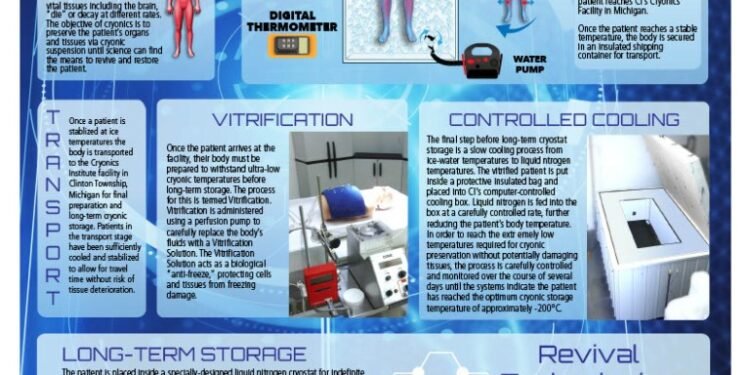Alcor explains that “Cryonics is the practice of preserving life by pausing the dying process using subfreezing temperatures with the intent of restoring good health with medical technology in the future.” ⁃ TN Editor
Suspended in a deep freeze, the growing number of ‘patients’ at the world’s biggest cryo-preservation facilities are taking a dice roll at another life.
Despite the current odds being vanishingly small, they represent an increasing number of people opting for an indefinite existence at -196C after their legal deaths.
The sleek white vats stood in rows at the Cryonics Institute (CI) storage facilities in Michigan contain bodies, body parts and pets from around the world.
Those frozen in liquid nitrogen awaiting possible future technological advances to revive them include chefs, students, secretaries and professors, with Brits being the most keen takers outside the US.
CI president Dennis Kowalksi tells Metro.co.uk that he regards the centres as a place of ‘awe and responsibility’. But it’s more of a waiting game than a place worthy of a sci-fi imagining, with the oldest patient having been in her sub-zero waiting room for more than 40 years.
Mr Kowalski conjured the visions of Leonardo da Vinci as he spoke of his conviction that humankind will one day be able to reverse engineer nature, and achieve the CI’s holy grail of reanimating the clinically dead.
‘Ironically, while the number of members is growing, I’m only surprised that we’re not more popular,’ he says.
‘What we are doing is pretty rational when you think about it.
‘Cryonics is like an ambulance ride to a future hospital that may or may not exist some day.
‘While we give no guarantees, if you are buried or cremated your chances of coming back are zero.
‘We are therefore a Pascal’s wager, or a gamble with little to lose and all to gain.’
‘Responsibility and awe’
Inside the main, hangar-like facility, ‘cryostats’ housing around 250 patients stand in neat rows.
The occupants at CI West include Thea Ettinger, the first patient, who went into cryo-suspension in 1977. Thea was born in 1899 – meaning a possible future that truly spans the centuries.
Her son Robert C. W. Ettinger, a decorated World War Two veteran regarded as the founding father of cryonics, is also in indefinite storage, along with his first and second wives.
The 7,000 square foot centre in Clinton Township, otherwise known as a farming community, is now at capacity so newcomers who have paid for full-body preservation at prices starting at $28,000 (£22,000) are being stored at a new facility nearby. Around 10 or 20 places have been taken up so far.
‘While we are the largest cryonics company in the world with the most patients in suspension, our two centres in Michigan are not as sci-fi as you might imagine,’ Mr Kowalski explains.
‘It’s more practical. We are affordable to the average person through life insurance and we are non-profit, with all of our records open to public scrutiny.
‘I guess if anything, when I walk between the cryo-stats, I feel a sense of responsibility and awe.
‘We don’t know if this will work but we believe life is precious and that there is no greater value than the love of our family and friends who we wish to save.’
Read full story here…









